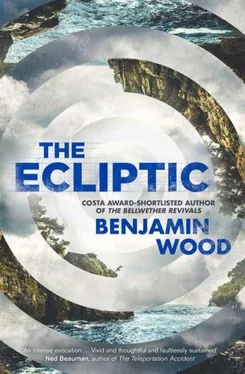I snapped my head round to look at the old man. He had one hand on the doorframe, one upon his hip, and he was gazing at the patterns on the rug. I could not tell if he was listening impassively or just pretending not to understand. ‘What Ender chooses to accept is up to him,’ I said. ‘I wouldn’t allow you to censor me like that.’
‘We all need this place for different reasons, is my point.’ The provost dabbed his nose. ‘Gülcan is distraught: she’s sacrificed a lot for her position here. There are people who rely on her. Ardak, too; myself, everyone . There is an honour code on which this refuge operates, and you have shown us just how dimly you regard it. Which, as I’ve said, is a tremendous disappointment to us all.’ He waved the old man over: two inward jabs of his fingertips. ‘Ender will take you down now. I’m giving you until dinnertime to think it over. But there really isn’t a choice to make here, as you know.’

Ender stayed with me the whole way. I was escorted through the empty corridors and down the stairs, until we found ourselves outside again in the sunshine on a slow walk back towards my lodging. I felt, in that moment, like some old zoo animal, captured on the brink of her escape, being paraded to her cage as an example to the others. The closeness of the old man’s steps behind me was pressuring and measured. I tried to see goodness in the sky and beauty in my surroundings — the neighbouring islands were so verdant with evergreens, the sea chalk-lined by ferry crossings, the apartment blocks of Heybeliada clustered far below, awaiting families to shelter through the coming summer. But where I used to look upon these things with reverence, they now filled me with anxiety.
The old man accompanied me as far as my door. ‘At the din-nerble,’ he said, ‘I will come back for you.’
‘Is this how it’s going to be now?’ I said.
He peered back vacantly.
‘A chaperone to every meal? Because I can tell you, it’s already getting tedious.’
‘Dinnerble. I will come back again.’
‘All right. But if you’re going to make a habit of this, you can knock for me and wait on the doorstep like everyone else.’ I let myself inside and he walked off, heading straight across the grass.
The studio was dark but I did not pull up the blinds or turn the shutters back. The warmth outside was yet to permeate the cinderblocks and the floor was cool against my stockinged feet. I did not light the stove. I went and fell upon my bed, front first, and smelled the stale mattress. Its linens had been stripped to cover up the mural and the bare fabric had a curious musk — the fetid body odour of a hundred sleepless nights, not all of them my own. I felt the need to get up, but I stayed exactly where I was, my cheek pressing against the springs until it tingled and went cold. I thought about lying there forever. And I realised that if I settled there, doing nothing, seeing out my days inside the studio with no purpose left at all, then I might as well go and throw myself onto the rocks. The boy would stay lost and so would my mural. But if I went now — if I cut the painting off the stretcher now —I could carry it with me. I could circumvent the gates before the dinner bell and try to get home. And even if I had no papers, at least I would have my work. At least I would have the truth. This thought lifted me up.
I ran to the bathroom, got out the jewellery box, collected the jetons and my opal ring.
I took as many garlands as I could see in the back of my closet. The mushrooms came off with the slightest push. I scooped them from the table, onto a sheet of tin foil, enfolding it with tape to keep the light out. On the shelf below, I found my suitcase. The parcel of mushrooms fitted in the front pouch. Next thing, I was pulling clothes from their hangers and tipping out my bedside drawers and throwing in the boy’s comics. I was unpicking all the samples from the wall, baling them with string, jamming them inside the case wherever they would fit. I was clearing a space on the floor for the canvas, shoving the workbenches into the doorway, spreading out the linens to protect it, lowering it face-down to the concrete. I was on my haunches with my knife, and cutting along the line of the brass tacks, pressing firmly, surgically, so the fabric separated from the wood. And then I was hauling the stretcher frame away — an empty rectangle, cumbersome but light — and I was standing over the blankness of that canvas once again, right back where I had started.
When I flipped it over, I could just make out three white circles of texture. I had no time to worry if the paint would crack in transit, or if the final layer was dry enough. The canvas was four feet tall and twice as wide, so it took some rolling up — I had no carpet tube or dowelling to guide it with. Planning ahead, I ran a loop of string along the edge, then bunched up the lip of the canvas into my fists, folding inwards, inwards, inwards, until the weave of the cloth found a natural curl. I rolled until I had a bulky cigarette shape with a string running through it, and taped along its join to hold it all together. I waterproofed it with black plastic sheeting and more tape, more tape, more tape, more, then tied the ends of the string to form a strap. I stood up to test it, holding the roll across my back like a quiver of arrows. The string dug into my breast, but it was secure and it was portable. I just hoped that it was strong enough to last.

His windowpane was dappled with the silhouettes of pines and skewed with the reflections of the mansion gables. But I could still see enough of Pettifer’s head above the top edge of his drafting board to read the glumness in his expression. He was gazing out into the trees so absently that he did not even notice me approaching. When I reached the sloping path down to his doorstep, my hurried movements seemed to startle him. He called to me: ‘Knell? What the heck—?’ Then he undid the latch to let me in. ‘Are you leaving already?’
‘Shshhh,’ I said, pushing past him. I threw my suitcase on his bed. ‘Close the door.’
‘What?’
‘Just do it.’
He did. ‘Oh, sure, fine. Don’t worry about the interruption or anything. I mean, it’s not as though I could possibly be—’
‘Shshhh.’
I went to draw the blind. There was just a single sheet of paper on his drafting table: a sketch of a vaulted doorway with a sort of fish-scaled covering. ‘I’ve been trying to invent a new type of awning,’ he said. ‘Collapsible but solid. Pointless, as it transpires. But I don’t suppose there’s any good reason why we’re standing in darkness now, either. . At least put a lamp on.’
‘ Don’t .’
‘What’s going on?’ he said. ‘I’m starting to sweat.’ He dabbed his forehead with his sleeve.
‘I need your help, Tif. It’s really important.’
‘Of course,’ he said, straightening his face. ‘What is it?’
His stove was hot behind my calves. ‘I can’t go to the mansion myself — don’t ask me why, just trust me.’
‘All right.’ Some hesitation in his voice. ‘All right.’
‘I need you to go and get Mac for me. Tell her if she’s got anything to give me, then she’d better bring it now.’
‘You seem a bit panicked. Is everything OK?’
‘Please, Tif. Please just do what I ask.’
‘All right, but I’m—’ He stopped himself. ‘What about Q? Should I bring him, too?’
‘Yes. If he’s there.’
‘Where else would he be?’
‘Just get him, Tif.’
‘OK, OK, I’ll put my shoes on.’ And he rushed to retrieve them from under his bed and clumsily tied up the laces. With one hand on the door latch, he turned. ‘Do you need me to run? Because, honestly, I might not make it up there in this shape.’
Читать дальше













